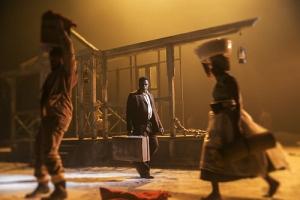Les Blancs review of Lorraine Hansberry's play at the National Theatre
Lorraine Hansberry is best remembered by her 1959 breakthrough play 'A Raisin in the Sun' which not only made her the first African American writer to be produced on Broadway, as well as one of the first women, but also found a new style of writing that cemented traditional dramatic conventions and elements alongside a contemporary topic. Her 1970 play 'Les Blancs', completed by her former husband Robert Nemiroff after her death in 1965 may not have had the same impact on modern drama, but the National Theatre's new production more than justifies its rediscovery and provides a striking example of theatre making at its finest.
At its heart, Hansberry's text feels almost Chekhovian in its scope and handling of the main setting, an unnamed colony that alternates between a mission hospital and a tribal hut. Drawing on some of the most western playwriting techniques the drama unfolds as two outsiders join the community - the perkily arrogant American Charlie Morris and expatriate Tshembe Matoseh who returns to see his family having moved away and married a white European.
What follows is a collision between black nationalism and white imperialism, with the rise of a terrorist group threatening not only the mission but also the wider compound and country. Granted, some sweeping statements are made and at times the characters can feel more like mouthpieces than truly fine-tuned humans, but their collective performances are never less that utterly honest.
There's an internal struggle for focus in the text especially as the tone shifts throughout the second act, and Matoseh struggles with issues bigger than himself. Danny Sapani gives a solid performance and doesn't let his character stew, instead he balances both rage and contemplation, thus becoming an effective and deliberate arbiter. He becomes the vital anchor the play needs, juggling relationships on both sides and instigating powerful dialogues with some of the more finely sketched characters.
Whilst the play itself may not be perfect, Yael Farber's production elevates it to a stratospheric level, which, complete with a set of commanding performances, makes this one of the strongest productions I've seen in the Olivier. Farber's skill at controlling the entire mise en scène is extraordinary - this is 'total theatre' at its finest. From the second you enter the auditorium the smell of the production hits you, and you're instantly immersed in the atmosphere. This is a rare example where the joins between the creative team are invisible; Farber brings together elements of sound design, spectacular lighting, composition and scenic design into one expertly curated and thoroughly compelling production.
Like her 2014 production of The Crucible at the Old Vic, Farber excels in drawing out sections without dialogue. The opening sequence is captivating and cements the themes firmly without saying a word. Whilst Soutra Gilmour's design my revolve a little too freely, it manages to feel both intimate and expansive at the same time, with Farber showing great skill at focusing attention through the use of the ever present ensemble. Complete with an authentic set of matriarchs and singers providing a chilling cultural soundtrack, the piece feels genuine and fascinatingly real.
This is everything good theatre should be - challenging, thought provoking and confrontational, delivered with the highest level of theatrical skill and ingenuity.
by Dom O'Hanlon.
"Revolution so real you can smell it... a compelling mix of atmosphere and argument"
Susannah Clapp for The Observer
"Hansberry's play is not flawless, particularly in the somewhat declamatory second act. But Farber's exquisite production tackles its moral complexities with finely calibrated assurance..."
Jane Shilling for The Telegraph
"Hansberry's most ambitious play, and director Yaël Farber's interpretation has a finely judged musicality."
Henry Hitchings for The Evening Standard
External links to full reviews from popular press
Observer - Telegraph -
Originally published on
